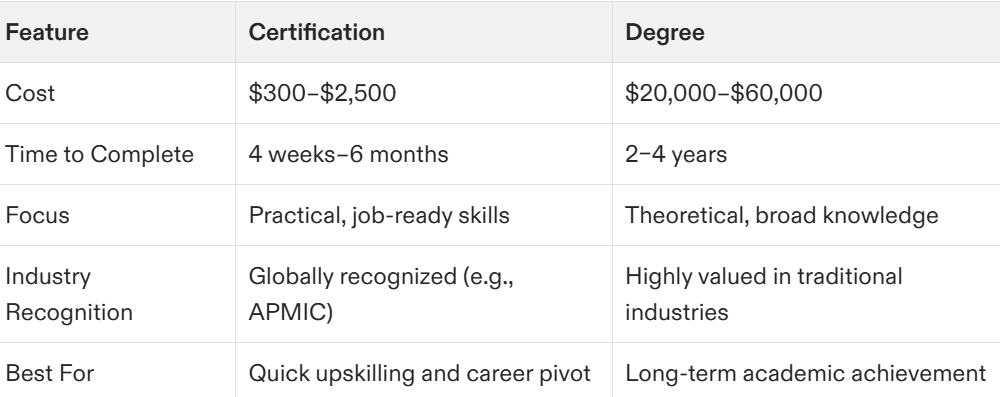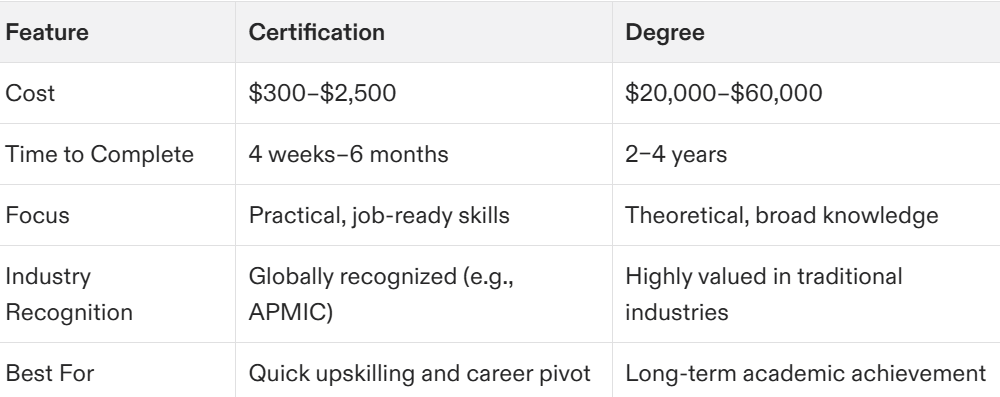Interested in project management but unsure whether to pursue a certification or a degree? When evaluating Project Management Certification vs Degree, the decision largely hinges on your career goals, budget, and timeframe. Both pathways have their unique benefits and can pave the way for successful careers in project management, but the best fit for you depends on your priorities.
This in-depth guide will explore everything you need to know about Project Management Certification vs Degree, from costs and timelines to career impact and global recognition. By the end, you'll know which path aligns with your professional aspirations.
Why Compare Project Management Certification vs Degree?
Project management is a booming field, with demand in industries like IT, healthcare, construction, and more. However, getting started or advancing in this field isn't a one-size-fits-all process.
- Certifications are efficient and specialized. They offer a focused curriculum designed to align with industry needs and provide skills that can be applied immediately.
- Degrees, on the other hand, provide broader, theoretical knowledge. They often include elective subjects, networking opportunities, and a structured timeline.
The choice between these depends on whether you're looking to upskill quickly or invest in long-term academic achievement.
For advanced career growth, an even more comprehensive option is the APMIC certification, offering unrivaled focus with 400+ modules covering project management, leadership, and advanced methodologies.
What Is a Project Management Certification?
A Project Management Certification is a credential awarded after completing a specialized program focused on core project management practices. These programs are geared toward providing practical knowledge and aligning learners with industry standards. Common examples include PMP (Project Management Professional), PRINCE2, and the APMIC certification.
Key Benefits of Certifications:
- Quick Turnaround: Certifications take a few weeks or months to complete, unlike multi-year degree programs.
- Affordable: Suitable for professionals on a budget, certification costs range from $300 to $2,000 on average, while degrees often cost tens of thousands of dollars.
- Globally Recognized: Certifications like PMP and APMIC are recognized across the globe, ensuring instant credibility.
Certifications are ideal for professionals seeking immediate, job-ready skills and validation in their expertise.
What Is a Project Management Degree?
A Project Management Degree is an academic qualification acquired through a university or college, typically after 2-4 years of study. Available at bachelor's, master's, and even doctoral levels, degrees are well-rounded and cover not just project management but also ancillary topics like finance, organizational behavior, and communication.
Key Benefits of Degrees:
- Comprehensive Frameworks: Degrees include electives, allowing learners to explore diverse fields like IT, marketing, and engineering project management.
- Networking Opportunities: Academic environments provide access to mentors, peers, and job placements.
- Eligibility for Higher-Level Positions: Some upper management roles prioritize candidates with a formal degree.
Comparing Project Management Certification vs Degree
1. Cost
Certification: $300–$2,500 (average)
Degree: $20,000–$60,000 (average)
Certifications like PMP or APMIC are more budget-friendly. Employers often subsidize costs due to the immediate ROI these programs provide.
2. Time Commitment
Certification: 4 weeks to 6 months
Degree: 2 to 4 years
Certifications can be completed part-time or online, making them ideal for working professionals. Degrees, however, require structured, often full-time, commitments.
3. Practical vs Theoretical Knowledge
Certifications like APMIC focus on practical, industry-applicable skills. Degrees often emphasize theory, with limited hands-on experience.
4. Employability
- Certifications align you with job-ready skills that employers value, especially in sectors like IT and finance.
- Degrees can open doors to roles at managerial or executive levels, but they demand a larger time and monetary investment.
Both paths come with their own pros and cons, as detailed in the comparison table below.
Is a Certification or a Degree Better for You?
Here are some quick scenarios to help you decide:
- If you’re a working professional: A certification provides targeted knowledge without disrupting your career. Consider the APMIC certification for a deep-dive curriculum tailored for career advancement.
- If you’re a recent graduate: Broad exposure and opportunities from a degree program may better suit your long-term development goals.
- If you need immediate results: Certifications provide credibility and skills faster than degrees, letting you land new roles or promotions within months.
- If your goal is senior leadership: A mix of education and advanced certifications like PMP or APMIC makes you a top contender for leadership roles.
Ultimately, the best choice between a Project Management Certification vs Degree depends on where you are in your career and what you wish to achieve next.
FAQ About Project Management Certification vs Degree
1. What is the main difference between a certification and a degree?
A certification offers specialized, short-term training in project management skills aligned with industry requirements. A degree, meanwhile, provides in-depth academic knowledge and may take years to complete.
If you're looking to gain practical skills quickly and affordably, certifications like APMIC offer an ideal option with advanced, globally recognized credentials.
2. Can I pursue a certification while working full-time?
Yes! Certifications like PMP, PRINCE2, and APMIC are designed to accommodate busy professionals. They are often self-paced, meaning you can balance work commitments while upskilling.
3. Do employers prefer certifications over degrees?
This depends on the role and industry. Certifications are widely preferred for technical and operational roles, while degrees can give you an edge in leadership positions. Combining both—a degree for theoretical grounding and certifications for practical relevance—can be the best strategy.
4. Which certifications are globally recognized?
Certifications like the PMP, PRINCE2 Practitioner, and APMIC are globally recognized as benchmarks for excellence in project management. These credentials enhance your ability to secure roles across industries and countries.
5. Is a degree essential for project management?
No. A degree is not a requirement for many project management roles. Certifications often provide enough credibility and practical knowledge to excel in project management, especially in industries like IT, healthcare, and construction.
Certification vs Degree at a Glance

Final Thoughts
When comparing Project Management Certification vs Degree, it’s crucial to factor in your personal and professional goals. Certifications provide an affordable and fast-track way to prove project management expertise, while degrees offer holistic academic preparation for broader horizons.
For professionals eyeing global-scale projects or senior-level roles, advanced certifications like APMIC not only enhance your credentials but equip you with cutting-edge skills to excel in the rapidly evolving project management landscape.
Choose the path that best aligns with your aspirations, and start building your future in project management today!



